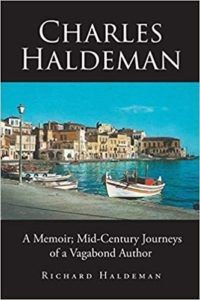Title: Charles Haldeman: A Memoir; Mid-Century Journeys of a Vagabond Author
Author: Richard Haldeman
Publisher: Page Publishing, Inc.
ISBN: 978-1647010546
Pages: 212
Genre: Author Biographies/Memoirs/Arts & Literature
Interviewed by: Tony Espinoza
Interview with Richard Haldeman
Today we are taking with author Richard Haldeman.
HBR: Tell us a little bit about yourself.
I am an 86-year-old retired college public relations director living in a small southern college town. This is my first published book, though my career (in journalism, teaching, and college public relations) has consisted largely of writing and editing. I’m married to a college biology professor, father of two daughters and a deceased son, and grandfather of two young men, one a college rising senior and the other a member of the high school class of 2021. I’m proud of both daughters, who have successful careers and marriages, and both grandsons, who are excelling academically and personally.
HBR: What was the inspiration behind your book, “Charles Haldeman: A Memoir; Mid-Century Journeys of a Vagabond Author”?
I was born into what I think was a unique family, yet one that lived through and reflected the important events of the Twentieth Century, both in America and throughout the world. My older brother was a part of many events of that era, lived among its literary community, and described it in three novels. His life itself contained so many aspects of a novel that it became the inspiration for this memoir.
HBR: What drew you into this particular genre?
Only this genre, a combination of family history and personal memoir, could tell this story. For years I have possessed a wealth of letters and documents about my family and my brother. These date back to my birth parents’ courtship letters and my German grandmother’s description of 1930s Germany. They include my brother Charles’s letters to our parents from the Navy, New York City, and Germany and descriptions by his friends of his life in Germany, and Greece. I have manuscripts of his novels, published and unpublished. But there are also memories, of his and my childhood, that only I now possess.
HBR: There are so many important moments in Charles’s life that feel profound and moving in this memoir/biography. What moment, if you had to pick just one, would you say helped define Charles’s life and why?
Charles’s life-defining moment was his decision to live in Greece, followed by his purchase of a home there. That decision led to tragedy in his personal life and disappointment in his literary life, but before that it brought him years of happiness. While Greece gave him the “sense of place” he lacked as a novelist, it provided problems and diversions that made it difficult to maintain the discipline required of a writer.
HBR: The book definitely does a great job of highlighting how Charles followed in his father’s footsteps and found his own path in life. What would you say drove Charles to not only spend so many years in Greece but to dedicate himself to his writing for so many years?
Paradoxically, while Charles felt America failed to live up to its principles, he had an idealistic view of Greece that nation could not fulfill, especially in a time of governmental turmoil. Charles loved Greece. After a wandering early life, he longed for a home and felt he had found one in Greece. That’s why he lived there more than 20 years. People there who knew him loved Charles. But the colonels’ government, which had already caused his feature film project there to fail, was always suspicious of this American foreigner. While he remained dedicated to writing, the market for fiction was already falling off, and there was a limited market for documentaries, his other writing strength. It was no longer easy for the expatriate author to work from Greece.
HBR: What advice would you give to aspiring or just starting authors out there?
From one who waited until his 80s to complete his first book, I would advise aspiring authors, whether young or old, to begin “now.” Delay is the enemy of authors. Every would-be writer should realize the discipline required to write; compensation, even for successful authors, rarely is equal to the time and effort spent. The reward is in the accomplishment.

